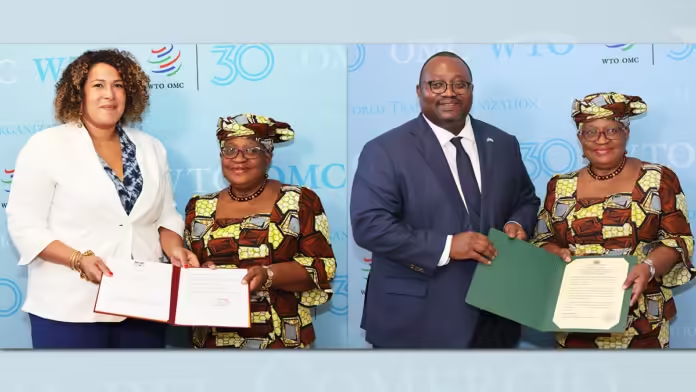Geneva, Switzerland, July 19, 2024 /ChatnewsTV/ —In a move towards sustainable ocean management, Benin and Sierra Leone have officially accepted the Agreement on Fisheries Subsidies, advancing the total number of formal acceptances to 80. Ambassadors Corinne Brunet of Benin and Lansana Gberie of Sierra Leone presented their countries’ instruments of acceptance to Director-General Ngozi Okonjo-Iweala at a ceremony, emphasizing their commitment to sustainable fishing practices and ocean conservation.
Director-General Okonjo-Iweala expressed her enthusiasm for the growing support of the Agreement. “I am delighted to receive formal acceptances of the Agreement on Fisheries Subsidies from Benin and Sierra Leone. Their support underlines the importance that they, as least-developed members, place on this Agreement and on global cooperation for upholding ocean sustainability and combatting illegal, unreported and unregulated fishing, to support livelihoods and food security in West Africa and around the world. I hope the remaining WTO members — and we need only 30 more — will quickly follow the leadership of Benin and Sierra Leone, so that this landmark agreement enters into force soon,” she said.
Ambassador Corinne Brunet of Benin highlighted the importance of the Agreement for her country. “By accepting the Agreement on Fisheries Subsidies, Benin contributes to achieving a major and historic outcome for WTO members, underscoring our determination to combine economic prosperity with sustainable preservation of marine resources. This is a crucial step in our pursuit of balanced and environmentally respectful development. We are committed to fostering economic prosperity while safeguarding our natural capital for future generations. We call on all WTO members to work towards the swift entry into force of the Agreement on Fisheries Subsidies by accelerating their national ratification processes,” she stated.
Ambassador Lansana Gberie of Sierra Leone emphasized the Agreement’s alignment with Sierra Leone’s national policies. “Sierra Leone’s ratification of this landmark fisheries subsidies agreement is a testament to our commitment to multilateralism, to the principles of sustainability and conservation, and to the fair and responsible exploitation of our natural resources. This ratification is firmly in keeping with our national policies, both economic and social, with a focus on preserving marine biodiversity, promoting sustainable fishing practices, and supporting the livelihoods of our fishing communities, some of which are under existential threats from foreign poachers and the adverse effects of climate change. With this instrument, we also commit to forging ahead with the second wave of negotiations, striving to achieve a meaningful agreement sooner rather than later. So, we call upon other countries that have not done so, particularly African and small coastal states like ours, to ratify this important agreement while engaged in further negotiations,” he remarked.
The acceptance by Benin and Sierra Leone brings the total number of African members formally accepting the Agreement to fifteen, nine of which are least-developed countries. The Agreement, adopted by consensus at the WTO’s 12th Ministerial Conference in Geneva in June 2022, will enter into force once accepted by two-thirds of the WTO membership, requiring 30 more formal acceptances.
The Agreement on Fisheries Subsidies establishes new, binding multilateral rules to curb harmful subsidies, which significantly contribute to the depletion of the world’s fish stocks. It also acknowledges the needs of developing economies and least-developed countries, providing a fund for technical assistance and capacity building to help them meet their obligations. The Agreement specifically prohibits subsidies for illegal, unreported, and unregulated fishing, for fishing overfished stocks, and for fishing on the unregulated high seas.
Members at the Ministerial Conference also agreed to continue negotiations on outstanding issues to further enhance the Agreement’s disciplines, aiming for additional provisions to be adopted in the future.





